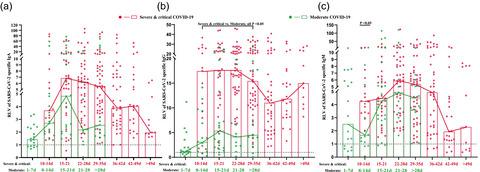当前位置:
X-MOL 学术
›
Clin. Exp. Immunol.
›
论文详情
Our official English website, www.x-mol.net, welcomes your
feedback! (Note: you will need to create a separate account there.)
Characteristics and roles of severe acute respiratory syndrome coronavirus 2-specific antibodies in patients with different severities of coronavirus 19.
Clinical & Experimental Immunology ( IF 3.4 ) Pub Date : 2020-07-24 , DOI: 10.1111/cei.13500 Z Huang 1 , H Chen 1 , M Xue 1 , H Huang 1 , P Zheng 1 , W Luo 1 , X Liang 1 , B Sun 1 , N Zhong 1
Clinical & Experimental Immunology ( IF 3.4 ) Pub Date : 2020-07-24 , DOI: 10.1111/cei.13500 Z Huang 1 , H Chen 1 , M Xue 1 , H Huang 1 , P Zheng 1 , W Luo 1 , X Liang 1 , B Sun 1 , N Zhong 1
Affiliation

|
The diagnosis of coronavirus 19 (COVID‐19) relies mainly upon viral nucleic acid detection, but false negatives can lead to missed diagnosis and misdiagnosis; severe acute respiratory syndrome coronavirus 2 (SARS‐CoV‐2)‐specific antibody detection is convenient, safe and highly sensitive. Immunoglobulin (Ig)M and IgG are commonly used to serologically diagnose COVID‐19; however, the role of IgA is not well known. We aimed to quantify the levels of SARS‐CoV‐2‐specific IgM, IgA and IgG antibodies, identify changes in them based on COVID‐19 severity, and establish the significance of combined antibody detection. COVID‐19 patients, divided into a severe and critical group and a moderate group, and non‐COVID‐19 patients with respiratory disease were included in this study. A chemiluminescence method was used to detect the levels of SARS‐CoV‐2‐specific IgM, IgA and IgG in the blood samples from the three groups. Epidemiological characteristics, symptoms, blood test results and other data were recorded for all patients. Compared to the traditional IgM–IgG combined antibodies, IgA–IgG combined antibodies are more effective for diagnosing COVID‐19. During the disease process, IgA appeared first and disappeared last. All three antibodies had significantly higher levels in COVID‐19 patients than in non‐COVID‐19 patients. IgA and IgG were also higher for severe and critical disease than for moderate disease. All antibodies were at or near low levels at the time of tracheal extubation in critical patients. Detection of SARS‐CoV‐2‐specific combined IgA–IgG antibodies is advantageous in diagnosing COVID‐19. IgA detection is suitable during early and late stages of the disease. IgA and IgG levels correspond to disease severity.
中文翻译:

严重急性呼吸综合征冠状病毒2特异性抗体在不同重度冠状病毒患者中的特征和作用19。
冠状病毒19(COVID-19)的诊断主要依靠病毒核酸检测,但假阴性可导致漏诊和误诊。重症急性呼吸综合征冠状病毒2(SARS‐CoV‐2)特异性抗体检测方便,安全且高度灵敏。免疫球蛋白(Ig)M和IgG通常用于血清学诊断COVID-19。但是,IgA的作用尚不清楚。我们旨在量化SARS‐CoV‐2特异性IgM,IgA和IgG抗体的水平,根据COVID‐19严重程度确定其变化,并确定组合抗体检测的重要性。这项研究包括COVID-19患者,分为重度和危重组和中度组,以及非COVID-19呼吸系统疾病患者。化学发光法用于检测三组血液样本中SARS-CoV-2特异性IgM,IgA和IgG的水平。记录所有患者的流行病学特征,症状,血液检查结果和其他数据。与传统的IgM–IgG组合抗体相比,IgA–IgG组合抗体对COVID-19的诊断更为有效。在疾病过程中,IgA首先出现,最后消失。这三种抗体在COVID-19患者中的水平均显着高于非COVID-19患者。重症和重症患者的IgA和IgG也高于中度疾病。危重患者气管拔管时所有抗体均处于或接近低水平。检测SARS‐CoV‐2特异性结合的IgA–IgG抗体对于诊断COVID‐19具有优势。IgA检测适用于疾病的早期和晚期。IgA和IgG水平与疾病严重程度相对应。
更新日期:2020-07-24
中文翻译:

严重急性呼吸综合征冠状病毒2特异性抗体在不同重度冠状病毒患者中的特征和作用19。
冠状病毒19(COVID-19)的诊断主要依靠病毒核酸检测,但假阴性可导致漏诊和误诊。重症急性呼吸综合征冠状病毒2(SARS‐CoV‐2)特异性抗体检测方便,安全且高度灵敏。免疫球蛋白(Ig)M和IgG通常用于血清学诊断COVID-19。但是,IgA的作用尚不清楚。我们旨在量化SARS‐CoV‐2特异性IgM,IgA和IgG抗体的水平,根据COVID‐19严重程度确定其变化,并确定组合抗体检测的重要性。这项研究包括COVID-19患者,分为重度和危重组和中度组,以及非COVID-19呼吸系统疾病患者。化学发光法用于检测三组血液样本中SARS-CoV-2特异性IgM,IgA和IgG的水平。记录所有患者的流行病学特征,症状,血液检查结果和其他数据。与传统的IgM–IgG组合抗体相比,IgA–IgG组合抗体对COVID-19的诊断更为有效。在疾病过程中,IgA首先出现,最后消失。这三种抗体在COVID-19患者中的水平均显着高于非COVID-19患者。重症和重症患者的IgA和IgG也高于中度疾病。危重患者气管拔管时所有抗体均处于或接近低水平。检测SARS‐CoV‐2特异性结合的IgA–IgG抗体对于诊断COVID‐19具有优势。IgA检测适用于疾病的早期和晚期。IgA和IgG水平与疾病严重程度相对应。











































 京公网安备 11010802027423号
京公网安备 11010802027423号